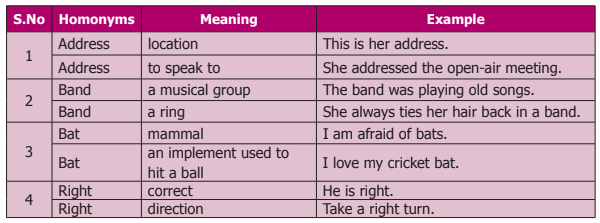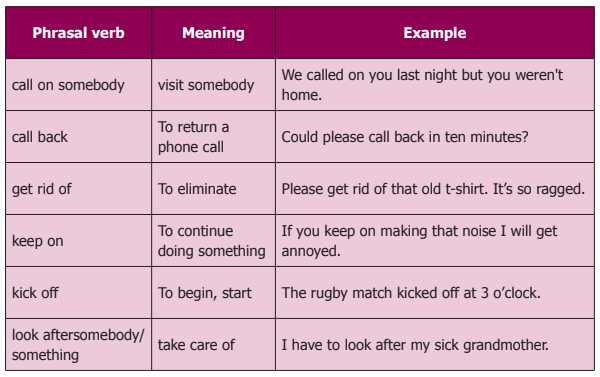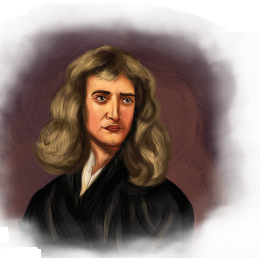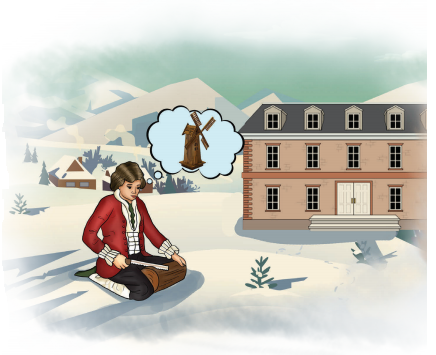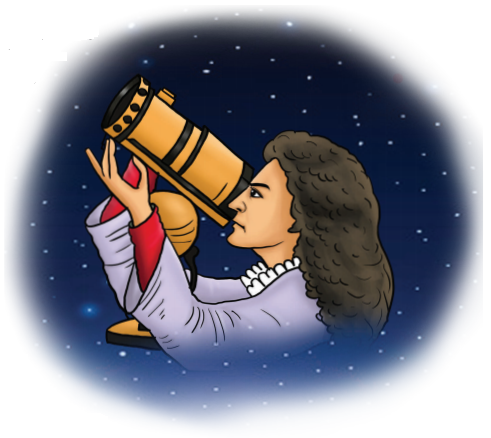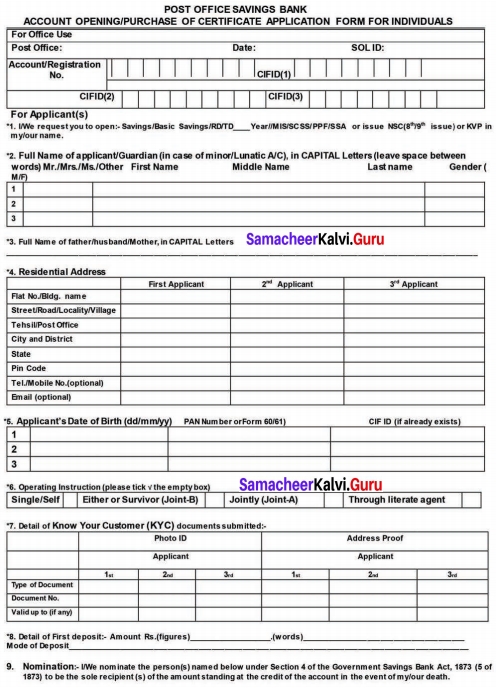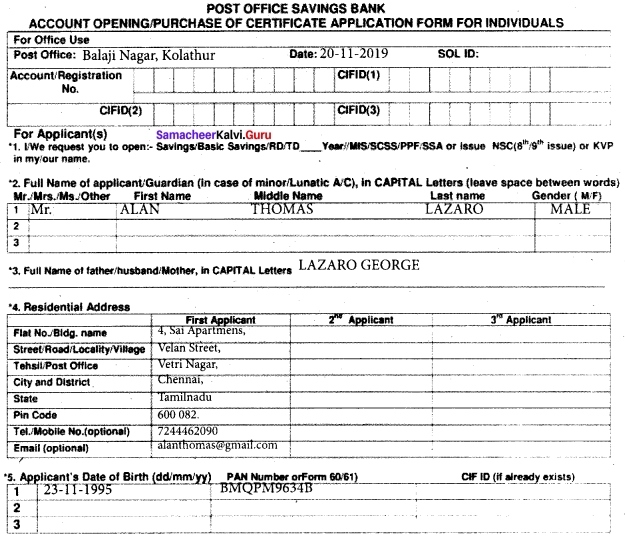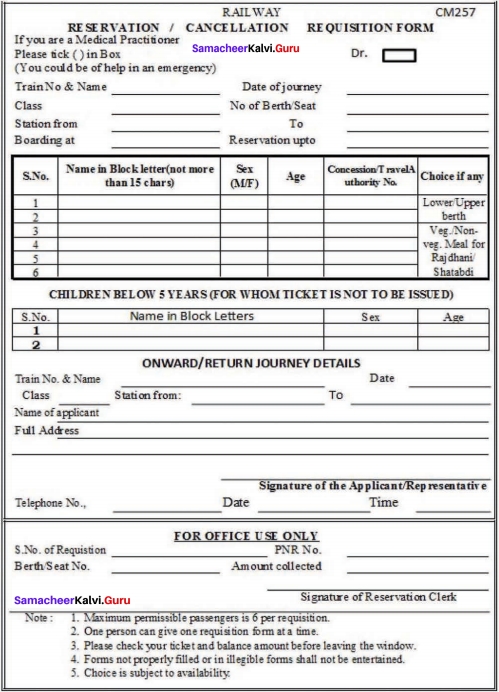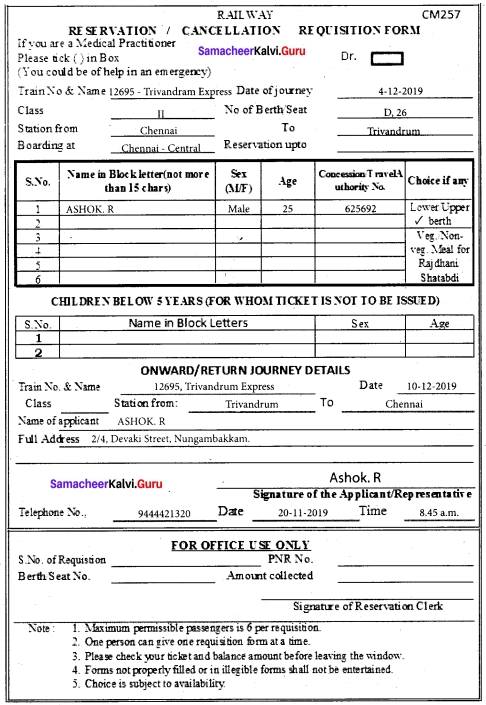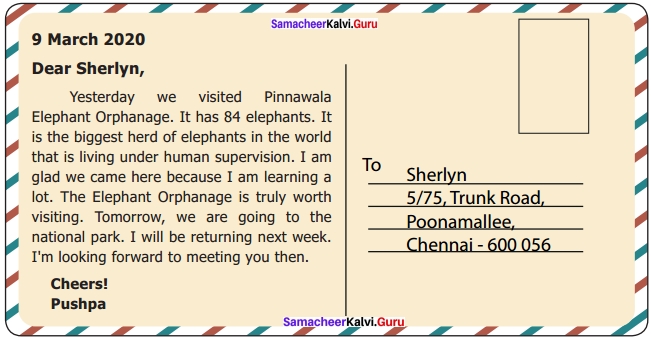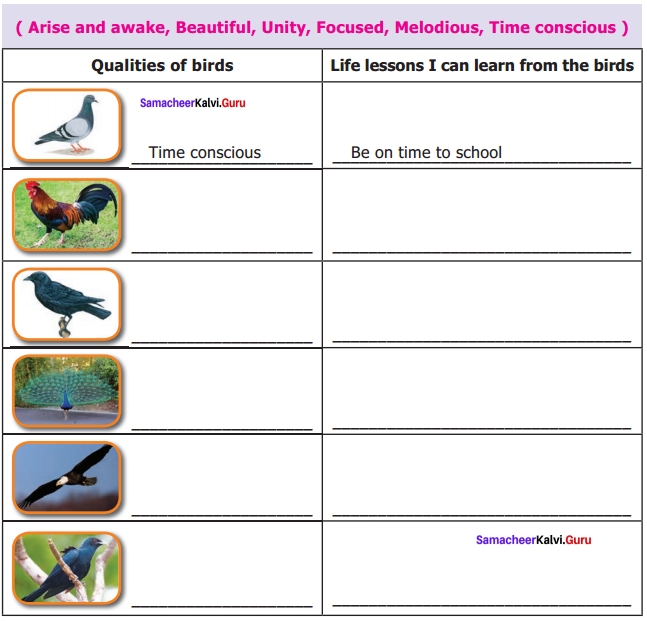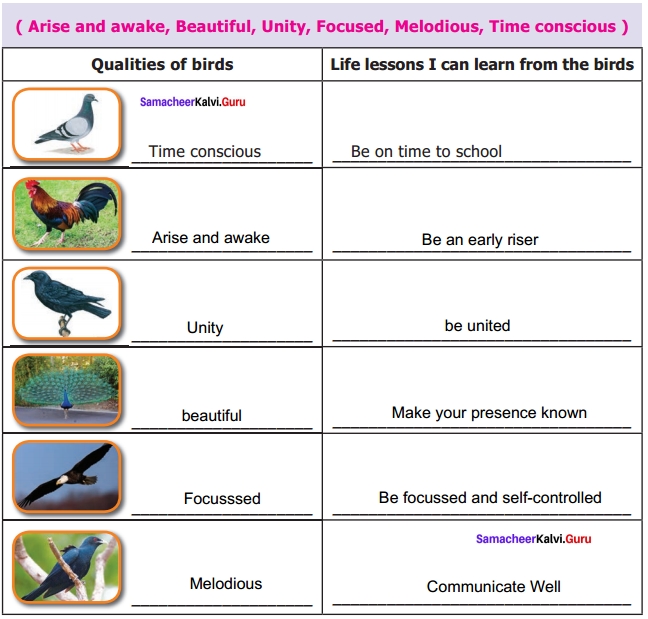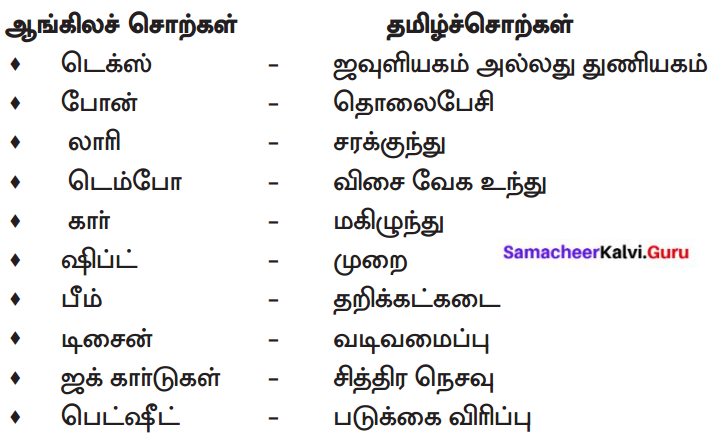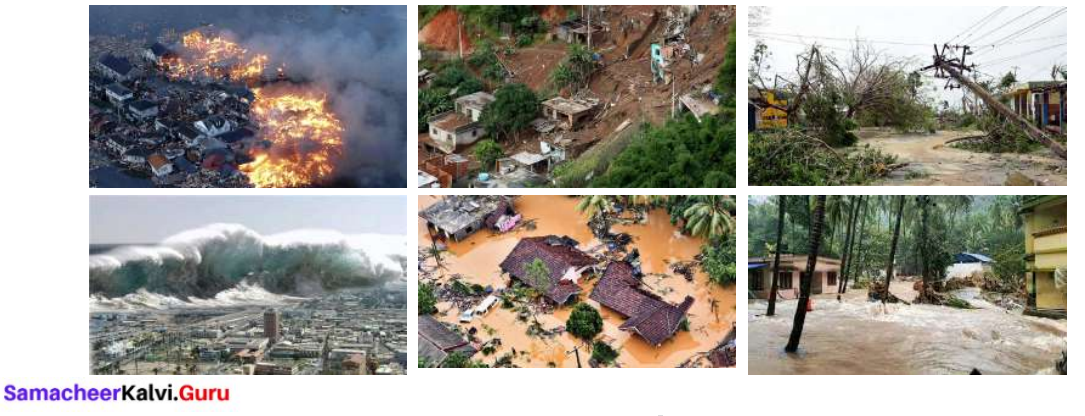Students can Download English Lesson 2 My Reminiscence Questions and Answers, Summary, Activity, Notes, Samacheer Kalvi 8th English Book Solutions Guide Pdf helps you to revise the complete Tamilnadu State Board New Syllabus and score more marks in your examinations.
Tamilnadu Samacheer Kalvi 8th English Solutions Term 2 Prose Chapter 2 My Reminiscence
Read and Understand
I. Fill in the blanks.
- The author speaks about the river _______
- The author s brother’s name is _______
- The _______ glimmered over the smooth flowing stream.
- The beauty of Bengal and the Ganges served as _______ and _______ to the author.
- The afternoons were spent by _______ and _______
Answers:
- Ganges
- Jyotirindra
- moonlight
- food and drink
- boating and singing
II. Answer the following in one or two sentences.
My Reminiscence Question 1.
Quote the expressions from the text when the author sees the Ganges again.
Answer:
“The Ganges again! Again those ineffable days and nights, languid with joy, sad with longing, attuned to the plaintive babbling of the river along the cool shade of its wooded banks”.
8th English My Reminiscence Question 2.
In what ways the river and its bank have changed?
Answer:
The river banks are thickly surrounded by green trees and plants. From them hung bunches of nests at the riverside, where the birds would have chirped, leaves rustled, and the wind rushed. Now it has been replaced by huge dragon-like mills making a hissing noise and letting out black smoke.
My Reminiscences Prose Summary Question 3.
How were the rooms arranged in his house?
Answer:
A flight of stone-flagged steps led to a long broad verandah. The rooms were not regularly arranged. All the rooms were not on the same level. Some rooms had to be reached by short flights of stairs. The big sitting room faced the landing steps.
III. Answer the following in a paragraph.
My Reminiscence Question And Answer Question 1.
How does the author spend his afternoon ? Explain.
Answer:
The author spent the rainy afternoons in an exciting frenzy way. He played the harmonium as he sang the old Vaishnava songs set to his times. On other afternoons, he sailed slowly in a boat singing Puravi accompanied by his brother Jyotirindra with his violin. They kept on varying the mode of their music with the declining day.
My Reminiscences Questions And Answers Question 2.
Describe how the river looks when he rows back
Answer:
On the west side of the river, the sun rays declined. On the east side of the river, the moon rises over the fringe of trees. A silver streak was formed where the land and water met. Boats were hardly seen. The trees bordering the river banks appeared like a dark shadow and the moonlight glowed over the smooth flowing stream.
My Reminiscences 8th Standard Question 3.
Draw the images in the box after reading the text carefully.
Activity done by the students
Vocabulary
Clipping Words
Clipping is the word formation process which consists in the reduction of a word to one of its parts. These words are called clipped words.
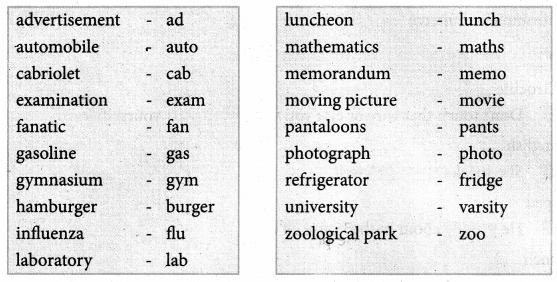
a. Find out the clipped words for the following.
- aeroplane
- microphone
- exhibition
- kilogram
- cafeteria
Answers:
- plane
- mike
- expo
- kilo
- cafe
b. Find and use the clipped words in your own sentence.

Blends
A blend word or a blend is a word formed from parts of two or more other words.
| bit | = binary + digit |
| brunch | = breakfast + lunch |
| camcorder | = camera + recorder |
| electrocute | = electro + execute |
| = electronic + mail | |
| mechatronics | = mechanics + electronics |
| moped | = motor + pedals |
| motel | = motor + hotel |
| newscast | = news + broadcast |
| smog | = smoke + fog |
| Spanglish | = Spanish + English |
| vitamin | = vital + amine |
a. Find out the blended words for the following.
- international + police
- helicopter + pad
- motor + hotel
- education + satellite
- electronic + commerce
Answers:
- interpol
- helipad
- motel
- edusat
- E-commerce
b. Use the blended words in your own sentence.
1. electrocute
Answer:
Don’t touch that wire or else you will electrocute yourself.
2. Spanglish
Answer:
She speaks spanglish well.
3. moped
Answer:
He nioped about in the house all day.
4. brunch
Answer:
I had my brunch at 12 noon.
5. smog
Answer:
The thick smog caused many problems to the people of this area.
Idioms – Additional Exercises
Food Idioms.
1. A hard nut to crack – a difficult problem to deal with.
Example: This problem is a hard nut to crack.
2. In the soup – to be in a difficult situation.
Example: When Harry lost his job, he was really in the soup.
3. Bread and butter – basic things needed to survive.
Example: Teaching is my bread and butter.
4. To bring home the bacon – to earn a salary.
Example: I’m looking for a job and so I need to do something to bring home the bacon.
5. have bigger fish to fry – have more important thing to fry.
Example: I have bigger fish to fry than this silly matters.
Sport Idioms.
1. Get the ball rolling – Do something to begin a process.
Example: As we are going to get the ball rolling now, please be seated.
2. Ball park figure – A rough estimate.
Example: Do you have a ball park figure for the cost of the renovations?
3. Heavy Hitter – a powerful, influential person.
Example: Tendulkar is a heavy hitter.
Number Idioms.
1. A million and one – very many.
Example: There are no answers for a million and one questions asked by these people.
2. Be in seventh heaven – Extremely happy.
Example: she was in seventh heaven, where she watched her favourite band play live.
3. Six feet under – Dead and buried.
Example: You can’t get my property, until I am six feet under.
Colours Idioms.
1. Beet red – dark red.
Example: My sister’s face turned beet red when I caught her singing in front of a mirror.
2. Black and Blue – bruised and beaten.
Example: We found the poor guy black and blue, near the train tracks.
3. Golden opportunity – The perfect chance.
Example : The model’s conference was a golden opportunity for me to sell my beauty products.
Animal Idioms.
1. Cat nap – a short sleep.
Example: I am going to have a cat nap while you’re cooking dinner.
2. Dog’s days – very hot days.
Example : We sleep in the basement during the dog days of August.
3. Horse around – play roughly
Example ; if you are going to horse around, please go outside.
Listening
Your teacher will read the text aloud. Listen carefully and answer the questions given below.
Ruskin Bond, short story writer, novelist and poet, the favourite writer of Indian children, was born on 19 May, 1934 at Kasauli in Himachal Pradesh. He had his early education at Bishop Cotton School, Shimla. Writing was in his blood. He was still at school when a story penned by him was published in the Illustrated Weekly of India.
His first novel, Room on the Roof, was published when he was still in his teens. This novel won him the John Rhys Memorial Award in 1957. Environment conservation is one of the major concerns of Ruskin Bond. He also writes about children and the simple hill folk of Uttarakhand. Simplicity and fluency of language and an insight into human nature are hallmarks of his style. His major writings include An Island of Trees, A Bond with the Mountains and The India I Love. He has also been honoured with the Sahitya Akademi Award for his contribution to Indian literature.
Complete the sentences:
My Reminiscences 8th English Question 1.
Ruskin Bond was born on at ________ in ________
Answer:
19 pay 1934, Kasauli, Himachal Pradesh
My Reminiscences By Rabindranath Tagore Summary Question 2.
His first novel was ________
Answer:
“Room on the Roof”
My Reminiscences By Rabindranath Tagore Summary In English Question 3.
________ is one of the major concerns of Ruskin Bond.
Answer:
Environment conservation
My Reminiscence Summary Question 4.
Mention some of his major works.
Answer:
His major writings include An Island of Trees, A Bond with the Mountains and The India I Love.
8th English My Reminiscence Book Back Answers Question 5.
How was he honoured for the contribution of Indian literature?
Answer:
He has been honoured with the Sahitya Akademi Award for his contribution to Indian literature.
Speaking
Take a few minutes and Make hints of the picture. Arrange your thoughts. Using the points you write, deliever a small speech focusing the issue picturised here. Give an interesting and informative speech, your speech should include the cause and the solution.
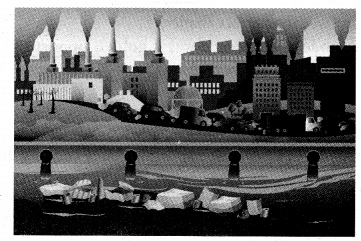
Tips for effective speaking
- Organise your points and ideas well.
- Don’t memorise the speech. If you forget a point, it will make you nervous.
- Avoid the things that are of no value or interest to the audience.
- Before you speak, take a deep breath,smile, greet the audience.
- Don’t be nervous about making a mistake.
- Interesting speak makes your mistakes nothing.
Answer:
I am Megna of class VIII A. I am going to deliver a speech on “Environmental Pollution”. One of the major problems of today in our country is ‘Pollution’. Environmental pollution refers to the presence of harmful and poisonous substances into our environment. It is not only limited to air pollution, but can also affect water bodies, soil, forests, aquatic life and all the land-living species as well. The main factors leading to environmental pollution are human-generated.
Since ages, we have been interfering with the environment in order to expand our habitat and to make living easy. Humans have invented automobiles, set up factories, cut down forests to make way for roads and cities all compromising the environmental health. Inadequate waste disposal and its littering have resulted in polluting our oceans and water bodies, rendering them useless and threatening the life of the species which depend on them. So I conclude my speech by saying that the government should take some precautionary measures to stop this major issue in our country.
Writing
My Reminiscences Summary Question 1.
Your school is going to organize an inter-school dance competition. Write a notice for your school notice board inviting names of all the interested students.
Answer:
Notice
RKR Govt higher Secondary School
Trichy
August 17th, 2019
Inter-school Dance Competition
Our school is going to organize an inter-school dance competition for classes 6 to 12 on September.8th at the school auditorium. We invite all the students, who are interested in dancing to register your names inthe school office by 25* of this month. For further details, contact the undersigned.
Vasanthi,
Secretary (Cultural in-charge).
My Reminiscences By Rabindranath Tagore Summary In Tamil Question 2.
Water supply will be suspended for ten hours (1Q am to 8 pm) on 5th of October for cleaning of the water tank. Write a notice in about 50 wdrils advising the residents to store water for a day. You are Santhosh, Secretary, Housing board, Officer’s colony, Thiruvarur.
Answer:
Notice
Housing Board Officer’s Colony
Thiruvarur
October 4th, 2019
This is to inform all the residents, of Shastri Nagar in Ihiruvarur to store water for a day as the water supply will be suspended for ten hours from 10 a.m. to 8 p.m. on 5* October 2019 for the cleaning of the water tank.
Santhosh,
(Secretary)
Question 3.
You are the head girl/boy Govt High School. Your school is soon going to publish the annual magazine next month. Write a notice for the notice board of your school inviting students to submit write-ups.
Answer:
Notice
Govt High School
Porur
October 19th, 2019
Our school is going to publish the annual magazine next month. All the students are invited to submit their write-ups for the magazine on or before 30th October 2019. You should mention your name and dass in the articles and write-ups.
Shalini,
(Head Girl)
Grammar
Conditional Sentences With ‘if’
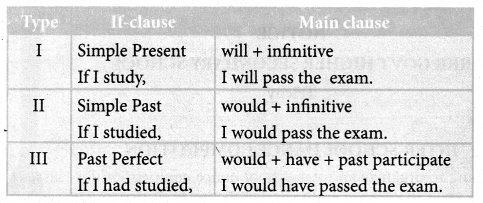
1. Complete the Conditional Sentences. Decide whether to use Type I, II or III.
- If I had time, I _______ (go) shopping with you.
- If you _______ (speak) English, you will get along with them perfectly.
- If they had gone for a walk, they _______ (turn) the lights off.
- If she _______ (come) to see us, we will go to the zoo.
- I would have told you, if I _______ (see) him.
Answers:
- would go
- speak
- would have turned
- comes
- had seen
2. Choose the best answer:
Question 1.
I will come if I _______ time.
(a) have
(b) had
(c) will have
Answer:
(a) have
Question 2.
If he is late, we _______ without him.
(a) would start
(b) would have started
(c) will start
Answer:
(c) will start
Question 3.
If you _______ me, I would tell you.
(a) will ask
(b) asked
(c) had asked
Answer:
(b) asked
Question 4.
Will it be all right if I _______ a friend tonight?
(a) had brought
(b) bring
(c) brought
Answer:
(b) bring
Question 5.
If you _______ to learn a musical instrument, you have to practice.
(a) wants
(b) wanted
(c) want
Answer:
(c) want
3. Match the following.
- If they worked hard – (a) She will come to our party.
- If I invite Shalini – (b) I would have bought these shoes.
- If I had got enough money – (c) They would win.
Answers:
- (c)
- (a)
- (b)
4. Fill in the blanks with correct verb forms.
Question 1.
If you _______ out with your friends tonight, I _______ the football match on TV.
(a) go, would watch
(b) go, will watch
(c) go, have watched
Answer:
(b) go, will watch
Question 2.
If he _______ harder, he _______his goals.
(a) tries, would reach
(b) tried, will reach
(c) tried, would reach
Answer:
(c) tried, would reach
Question 3.
If we _______ to the radio, we _______ the news.
(a) listen, would hear
(b) had listen, will hear
(c) listen, would hear
The correct Answer:
listened, would have heard
Sentence Pattern
1. Choose the right pattern.
Question 1.
The wall collapsed.
(a) SV
(b) SVO
(c) SVIODO
Answer:
(a) SV
Question 2.
During the war, many people lost their homes.
(a) SV
(b) SVIODO
(c) ASVDO
Answer:
(c) ASVDO
Question 3.
I promised the children a trip to the zoo.
(a) SVO
(b) SVDOIO
(c) SVIODO
Answer:
(c) SVIODO
Question 4.
In 1998, Frank moved to London.
(a) ASVA
(b) ASVO
(c) SVIODO
Answer:
(a) ASVA
Question 5.
Pooja hired a bicycle.
(a) SV
(b) SVO
(c) SVA
Answer:
(b) SVO
2. Write two sentences for each pattern.
1. SV
Answer:
They walked.
We studied.
2. SVO
Answer:
She ate the food.
Ravi kicked the ball.
3. SVC
Answer:
He is a surgeon.
My father is a painter.
4. SVA
Answer:
We stay in Chennai.
They danced gracefully.
5. SVOC
Answer:
John made Jane angry.
He made him the captain.
6. SVIODO
Answer:
My mother gave me a beautiful frock.
He presented my dad a watch.
7. ASV
Answer:
Yesterday, we arrived.
In 2019 they succeeded.
8. SVAA
Answer:
They came by bus yesterday.
The bank opens at 10 a.m. tomorrow.
My Reminiscence Additional Questions
I. Choose the correct synonyms for the italicized words.
Question 1.
… attuned to the plaintive babbling of the river…
(a) happy
(b) sounding sad
(c) thankful
(d) jocular
Answer:
(b) sounding sad
Question 2.
Even our hours of mental siesta have been narrowed down.
(a) study
(b) deep sleep
(c) afternoon nap
(d) wake
Answer:
(c) afternoon nap
Question 3.
Some rainy afternoons I spent in a veritable frenzy.
(a) harmony
(b) uncontrolled excitement
(c) agony
(d) peace
Answer:
(b) uncontrolled excitement
Question 4.
Again those ineffable days and nights, languid with joy.
(a) moving slowly
(b) active
(c) lively
(d) alert
Solution:
(a) moving slowly
Question 5.
And yet time has wrought many changes.
(a) foiled
(b) retarded
(c) caused
(d) prevented
Solution:
(c) caused
Question 6.
Men and women in festive garb were going and coming.
(a) mood
(b) feast
(c) jewellery
(d) clothes
Answer:
(d) clothes
II. Choose the correct antonyms for the italicized words.
Question 1.
Our little riverside nests, clustering under their surrounding greenery.
(a) grouping
(b) combination
(c) scattering
(d) crowding
Answer:
(c) scattering
Question 2.
I spent in a veritable frenzy, singing away old Vaishnava songs.
(a) more exciting
(b) boring
(c) absolute
(d) proper
Answer:
(b) boring
Question 3.
Many dedicated lotus blossoms/loafing down the sacred stream.
(a) drifting
(b) wafting
(c) fluttering
(d) sinking
Answer:
(d) sinking
Question 4.
The moonlight glimmered over the smooth flowing stream.
(a) sleek
(b) rough
(c) lustrous
(d) mild
Answer:
(b) rough
Question 5.
Mental siesta have been narrowed down to the lowest limit.
(a) restricted
(b) widened
(c) constricted
(d) tapering
Answer:
(b) widened
Question 6.
I was then busy with the Evening Songs
(a) active
(b) hectic
(c) idle
(d) restless
Answer:
(c) idle
III. Choose the correct answer and write (MCQ) :
Question 1.
My _______ Jyotirindra was living in a river-side villa.
(a) uncle
(b) father
(c) son
(d) brother
Answer:
(d) brother
Question 2.
Some rainy _______ I spent in a veritable frenzy.
(a) nights
(b) afternoons
(c) evenings
(d) mornings
Answer:
(b) afternoons
Question 3.
The dragon-like mills made hissing sound and let out black _______
(a) powder
(b) smoke
(c) liquid
(d) dirt
Answer:
(b) smoke
Question 4.
Tagore’s brother Jyotirindra accompanied him with his _______
(a) harmonium
(b) guitar
(c) violin
(d) shruti
Answer:
(c) violin
Question 5.
The big sitting room had stained glass _______ with pictures.
(a) doors
(b) partition
(c) windows
(d) shelves
Answer:
(c) windows
Question 6.
Tagore used his topmost round tower room for writing
(a) essays
(b) stories
(c) reports
(d) poetry
Answer:
(d) poetry
Question 7.
Tagore and his brother lived in a called Moran’s Garden.
(a) villa
(b) lane
(c) apartment
(d) cottage
Answer:
(a) villa
Question 8.
At night the fringe of on the river bank, was reduced to a deep shadow.
(a) pots
(b) waters
(c) trees
(d) steps
Answer:
(c) trees
Question 9.
Jagore sang old _______ songs set to his own tunes.
(a) Vaishnava
(b) Shiva
(c) Krishna
(d) Durga
Answer:
(a) Vaishnava
Question 10.
Tagore heard the babbling of the along its cool wooded banks.
(a) lake
(b) sea
(c) river
(d) pond
Answer:
(c) river
IV. Give very short answers :
Question 1.
Where was Jyotirindra’s villa?
Answer:
Jyotirindra’s villa was at Chandernagore.
Question 2.
How was the Bengal sky?
Answer:
The Bengal sky was full of light.
Question 3.
What was replaced by the mill?
Answer:
The little riverside nests were replaced by the mill.
Question 4.
To what does Tagore compare his lovely riverside days?
Answer:
Tagore compares his lovely riverside days to lotus blossoms floating down the stream.
Question 5.
“Western sky close the doors of its factory of golden toys” What are ‘golden toys’?
Answer:
‘Golden toys’are the golden rays of the sun.
Question 6.
What can. Tagore see from his round tower room?
Answer:
Tagore can only see the treetops and the open sky from his round tower room.
Question 7.
Where did the flight of stone-flagged steps lead to in the villa?
Answer:
The flight of stone-flagged steps led to the long, broad verandah in the villa.
Question 8.
What happened when the moonlight fell on the stained glass windows?
Answer:
When the moonlight fell on the stained glass windows, the pictures bn them shone wonderfully.
Question 9.
Tagore says, “Here it felt indeed like home” Where?
Answer:
Along the cool, shaded, wooded banks of the river Ganges.
Question 10.
‘Hydra-headed unrest has invaded every department of life”. What does it mean?
Answer:
This means that many multiple unrests have entered every part of our life.
V. Give short answers :
Question 1.
How does Tagore describe the atmosphere at the river Ganges?
Answer:
Tagore says that thegentle, pleasant flow of the river Ganges makes a sad mourning sound. Its wooded banks give cool shade. The sky above the river is bright, as the river flows slowly, the breeze is pleasant. At the horizon of the broad river, the green earth and blue sky meet.
Question 2.
What changes has modern lifehrought at the riverside?
Answer:
The thick greenery and nests at the riverside have been replaced by dragon-like, noisy mills giving black smoke. This has removed not only the physical rest but also the mental rest during the dull afternoons. Many problems have entered into every part of our life.
Question 3.
Tagore mentions about pictures on two stained glass windows. Describe them separately.
Answer:
Picture I: A couple were swinging in the swing hanging from a branch half-hidden in dense foliage under the shade of the trees. When the moonlight fell on the picture it made alive the love thrills of the swinging couple in the serene woodlands of the river bank.
Picture II: Men and women were climbing up and down in grand dresses on the flight of steps leading to a castle-like a palace. When the moonlight fell on this picture, it revealed the grand festive celebrations of early days in silence but more powerfully without words.
Question 4.
What was food and drink for Tagore?
Answer:
The plaintive babbling of the river Ganges along with the cool shade of its wooden banks, the Bengal sky-full of light, south breeze, the flow of the river, the broad stretch of the river from one horizon to the other, were like food and drink for the hungry and thirsty soul of Tagore.
VI. Answer in detail:
Question 1.
Give a clear sketch of‘Moran’s Garden’.
Answer:
‘Moran’s Garden’ was a riverside villa at Chandernagore in Hoogly district, West Bengal. Tagore’s brother Jyotirindra and his sister-in-law lived there. Tagore stayed with them. The boats came till the landing steps of the villa. In the late evenings, the family sat on the terrace facing the river.
A flight of stone embedded steps lead from the riverside water to a long, broad verandah of the house The rooms were not regularly arranged and all were not the same level Some rooms had to be reached by short flights of stairs. The big sitting room overlooking the landings steps had stained glass windows with coloured pictures.
The topmost room of the house was in a round tower with windows opening to every side. Nothing can be seen from the windows except the treetops and the open sky. Tagore used this room for writing poetry.
Vocabulary – Additional
Clipped Words
Choose the dipped form of the word for ………….
Question 1.
Choose the clipped form of the word for ‘bicycle’.
(a) byke
(b) bike
(c) cycle
(d) bicy
Answer:
(a) byke
Question 2.
Choose the clipped form of the word for ’advertisement’.
(a) advertise
(b) ad
(c) ads
(d) advert
Answer:
(b) ad
Question 3.
Choose the clipped form of the word for ‘demonstration’.
(a) demo
(b) demon
(c) station
(d) demons
Answer:
(a) demo
Question 4.
Choose the clipped from of the word for ‘motorbike’.
(a) motor
(b) moto
(c) bikes
(d) bike
Answer:
(d) bike
Question 5.
Choose the clipped from of the word for ‘pressure cooker’.
(a) cooker
(b) pressure
(c) sure
(d) cook
Answer:
(a) cooker
Question 6.
Choose the dipped from of the word for ‘handkerchief’.
(a) hand
(b) chief
(c) kerchief
(d) handker
Answer:
(c) kerchief
Question 7.
Choose the dipped from of the word for ‘newscast’.
(a) cast
(b) new
(c) casts
(d) news
Answer:
(d) news
Question 8.
Choose the dipped from of the word for ‘public house’.
(a) pub
(b) pubhc
(c) house
(d) use
Answer:
(a) pub
Blended Words
Choose the blended form of ……………..
Question 1.
Choose the right combination for the blended word ‘interpol’.
(a) international + policy
(b) interstate + police
(c) international + politics
(d) international + police
Answer:
(d) international + police
Question 2.
Choose the right combination for the blended word ‘lecdem’.
(a) lector + demarcate
(b) lecture + demand
(c) lecture + demonstration
(d) lecture + demonstrator
Answer:
(c) lecture + demonstration
Question 3.
Choose the right combination for the blended word ‘brunch’.
(a) brief + lunch
(b) breakfast + lunch
(c) break + crunch
(d) break + lunch
Answer:
(b) breakfast + lunch
Question 4.
Choose the right combination for the blended word ‘medicare’.
(a) medical + scare
(b) medicine + care
(c) medical + care
(d) medical + daycare
Answer:
(c) medical + care
Question 5.
Choose the right combination for the blended word ‘edutainment’.
(a) education + department
(b) education + entertainment
(c) educational + entertainment
(d) educate + entertain
Answer:
(b) education + entertainment
Question 6.
Choose the right combination for the blended word ‘infotech’.
(a) information + technological
(b) inform + technical
(c) information + technology
(d) information + technique
Answer:
(c) information + technology
Question 7.
Choose the right combination for the blended word ‘bit’.
(a) biotic + digit
(b) billion + digit
(c) binary + bitt
(d) binary + digit
Answer:
(d) binary + digit
Question 8.
Choose the right combination for the blended word ‘byte’.
(a) binary + table
(b) binary + template
(c) byline + tech
(d) bypass + technique
Answer:
(a) binary + table
Grammar – Additional
Conditional Clauses
I. Choose the best answer:
Question 1.
If I play well, I _______ the match.
(a) would win
(b) will win
(c) would have won
Answer:
(b) will win
Question 2.
If you wrote neatly, you _______ get a prize.
(a) would
(b) will
(c) would have
Answer:
(a) would
Question 3.
If my friend gets the afternoon off, he _______ meet me at the station.
(a) would
(b) would have
(c) will
Answer:
(c) will
Question 4.
Would you mind, if I _______ the window?
(a) open
(b) opened
(c) would open
Answer:
(b) opened
Question 5.
If my father don’t pick me up, I _______ take the bus home.
(a) will
(b) would
(c) would have
Answer:
(a) will
Question 6.
If they had invited me, I _______ have said no.
(a) will
(b) will not
(c) wouldn’t
Answer:
(c) wouldn’t
Question 7.
If I did it, nobody _______ do it.
(a) would
(b) will
(c) will not
Answer:
(a) would
Question 8.
I ________ buy these, ifthey fitted me.
(a) will
(b) would have
(c) would
Answer:
(c) would
Question 9.
If he did not know the answer, it ________ surprise me.
(a) would not
(b) will
(c) would have
Answer:
(a) would not
Question 10.
If you had switched on the lights, you ________ fallen over the chair.
(a) would have
(b) would not have
(c) would
Answer:
(b) would not have
II. Match the following :
- If you like me, – (a) I wouldn’t be here.
- If you want to make friends, – (b) open the door.
- If opportunity knocks, – (c) I will get detention.
- If I had never met you, – (d) you can’t be shy
- If I am late to school, – (e) let me go
Answer:
- e
- d
- b
- a
- c
III. Fill in the blanks with the correct verb forms :
Question 1.
If you _______, I _______ With you to the store
(a) wanted, may come
(b) want, can come
(c) want, can not come
Answer:
(b) want, can come
Question 2.
If I _______ late to school, I _______ Punished
(a) am, will be
(b) Was, would be
(c) was, will be
Answer:
(a) am, will be
Question 3.
If I _______ so much candy, I _______ hungry.
(a) hasn’t eaten, may be
(b) hadn’t eaten, might be
(c) had eaten, may be
Answer:
(b) hadn’t eaten, might be
Question 4.
If you _______ happy, I _______ happy.
(a) are, am
(b) were, was
(c) are, was
Answer:
(a) are, am
Question 5.
If there _______ snow, we _______ snowman
(a) was, made
(b) was, make
(c) is, make
Answer:
(c) is, make
Sentence Pattern
Identify the pattern of the following sentence :
Question 1.
This shoe is large.
(a) S V O
(b) S V C
(c) S V A
(d) S V O C
Answer:
(b) S V C
Question 2.
His father gave him his school bag.
(a) S V C
(b) S V O C
(c) S V O
(d) S V IO DO
Answer:
(d) S V IO DO
Question 3.
The player entered the room.
(a) S V O
(b) S V A
(c) S V C
(d) SVAC
Answer:
(b) S V A
Question 4.
Eve – Teasers must be punished severely.
(a) S V A C
(b) S V C
(c) S V O
(d) S V A
Answer:
(d) S V A
Question 5.
We wear woolen clothes in winter season.
(a) S V O C
(b) S V IO DO
(c) S V O A
(d) S V O
Answer:
(c) S V O A
Question 6.
I shall meet you tomorrow.
(a) S V O
(b) S V IO DO
(c) S V O A
(d) S V O C
Answer:
(c) S V O A
Question 7.
He answered my question instantly.
(a) S V O C
(b) S V C A
(c) S V IO DO
(d) S V O A
Answer:
(d) S V O A
Question 8.
They named the child Prem.
(a) S V A C
(b) S V O C
(c) S V C A
(d) S V IO DO
Answer:
(c) S V C A
Question 9.
We completed the work on time.
(a) S V O C
(b) S V A C
(c) S V O A
(d) S V C
Answer:
(c) S V O A
Question 10.
The meeting ended with a vote of thanks.
(a) S V A
(b) S V C
(c) S V O
(d) S V O A
Answer:
(a) S V A
My Reminiscence Summary
Tagore returned home : from the outset of his second voyage to England. His brother Jyotirindra lived in a river-side villa at Chandannagar, in West Bengal. Tagore went there to stay with him.
With a sad longing, Tagore recaptured his incredible days spent joyfully along the wooded banks of the river Ganges. The bright sky, breeze, flow of the river, it’s stretch from horizon to horizon, greenery, all were the food and drink for the hungry and thirsty soul of the author.
The author noticed many changes when he visited the Ganges after a long time. The greenery had been replaced by huge noisy mills emitting smoke. This might be for good, but the author could not agree on it.
The author spent his afternoons at the riverside singing songs, to his own tunes and playing the harmonium. Sometimes he sailed in the boat singing songs with his brother playing the violin, till the evening.
At night Tagore sat on the terrace facing the river. He viewed the river reflecting the moonlight, dark trees bordering the river banks and a silver streak separating the land and water.
Tagore described his villa, ‘Moran’s Garden’. It had stone stairs leading to a broad verandah. The rooms were not on the same level and not regularly arranged. The big sitting room facing the landing steps had staired glass windows with coloured pictures.
One picture had a swing hanging from a dense branch with a couple on it. The other picture had people walking on a stair-case leading to a castle like palace in grand dresses. When the light fell on the glass pictures, it made the scene alive.
Tagore’s room was in a round tower, on the top, with windows around viewing the treetops and sky. Tagore wrote his famous poem from this room.
